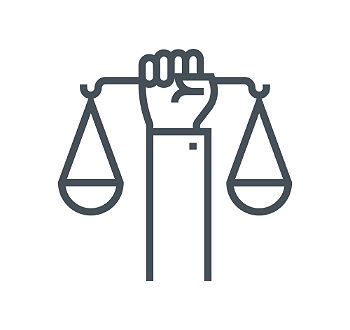Illegal Discrimination In The Workplace
Discrimination can be obvious, a racial slur or sexist remark, but perhaps more often than not, discriminatory conduct on the job is more insidious. It’s subtle and hidden, but no less harmful – and no less illegal.
At bottom, all of America’s anti-discrimination laws prohibit employers from treating certain employees differently from other employees, based solely on personal characteristics. It’s about fairness and, as a society, we’ve come to the conclusion that it’s fundamentally unfair for people to be treated differently just because they’re black or women or love who they love and so on.
Discrimination Laws 101
Your right to work free of discrimination begins far before you’re even hired. Under federal law, there’s no room for unequal treatment in the hiring process. There’s no room for discrimination in scheduling, work assignments or firing decisions, either. If you can do the job, there’s no personal quality that can get in the way of you getting that job and doing it.

Our nation’s anti-discrimination laws prohibit intentional, explicit acts or policies that are unfair, like failing to promote a person of color, even though she is the most qualified candidate, just because she is a person of color. But they also prohibit purportedly “neutral” workplace policies that disproportionately affect people of a certain class.
For example, let’s say a fire department has a height requirement for hiring, around 5 foot 6 inches. Since women in the US average 5 foot 4 inches, you could make a good case that the fire department’s policy disproportionately impacts women, but doesn’t impact men in the same way. This kind of discrimination is called “disparate impact.” But it’s not always illegal. If the employer can demonstrate that their hiring requirement, like a certain height, is essential for performing a fundamental aspect of the job, then their policy might be okay.
For the purposes of federal law, consistency is key. If one employee has to meet a certain requirement then all employees have to meet that requirement. Requiring a language comprehension test is only legal if every prospective employee has to take the test.
Which Laws Protect My Workplace Rights?
Title VII of 1964’s Civil Rights Act, which applies to almost every private employer, state or local government and educational institution, prohibits discrimination based on a worker’s:
- race
- color
- religion or lack of belief
- sex (a class that has come to include gender identity and sexual orientation, as well as pregnancy)
- national origin (includes language)
- age (applicable to employees 40 and older)
In employment law, these qualities or characteristics are called “protected classes.”
One year before the Civil Rights Act, the Equal Pay Act of 1963 made it illegal for any employer covered under the Fair Labor Standards Act to pay similarly-skilled employees working substantially equivalent jobs differently based solely on their gender. Nine years after, in 1973, the Rehabilitation Act, extended these anti-discrimination protections to employees of the federal government.
In 1990, Congress passed the Americans with Disabilities Act, prohibiting workplace discrimination against people with medically-recognized mental or physical disabilities. But more than that, the Act also requires that employers make “reasonable accommodations” (a phrase that is up for significant interpretation) for those employees with disabilities.
What About Small Employers?
Surprisingly, very small businesses (usually around one to three employees) probably don’t have to worry about the majority of anti-discrimination laws, except for the Equal Pay Act, which applies to employers regardless of their size.
But that’s only federal law. There may be a state law, or even more local ordinance, where you live that prohibits discrimination for small employers. To learn more about the discrimination laws in your neck of the woods, click here.
It’s also possible to fight for your rights to a discrimination-free workplace, even if you work for a very small company, under a different set of legal theories. While federal law may not prohibit discrimination at small businesses, it was never meant to allow discrimination at those businesses. That would be absurd.
Instead of filing suit under a federal or state law, it’s possible to file suit under any one of several “common laws,” legal theories that aren’t written into law by legislators, but are recognized through tradition and prior court rulings. Under certain circumstances, for example, you could argue that you were wrongfully discharged or that being fired amounted to an intentional attempt to inflict emotional distress.
What About Other Employees?
It’s a matter of degrees. In most cases, an isolated, or off-hand comment, though offensive, will not be considered discrimination or harassment in a court. What makes the difference, for legal purposes, is whether or not the conduct creates a hostile environment, and most courts have held that repeated unwelcome conduct is necessary to create such an environment.
Here are the factors the Labor Department considers in determining whether conduct constitutes illegal harassment:
- It’s unwelcome – you didn’t solicit the conduct and you saw it as undesirable or offensive.
- It’s based on your protected status – the conduct was motivated by your race, color, sex or other protected class.
- It’s subjectly abusive to you – you experience the conduct as abuse.
- It’s objectively severe and pervasive enough to create an environment that reasonable people would consider hostile or abusive.
“Severe and pervasive” is the real sticking point here and, in practice, it will be determined on a case-by-case basis. But in general, there are six different factors Labor officials take into account:
- frequency – how often the harassing conduct occurs
- severity – how serious the conduct was
- actions or words – generally, physical threats are considered more severe than abusive language
- work interference – whether or not the unwelcome conduct interfered with your ability to do your job
- psychological effect – what impact the conduct had on your psychological and emotional well-being
- harasser – the Labor Department may view harassment committed by a supervisor at the business less favorably than harassment from a lower-level employee
Note that none of these factors are required for abusive conduct to be considered illegal harassment, and no one factor takes precedence over any others.
Do Discrimination Laws Apply To Independent Contractors?
Not explicitly. The Civil Rights Act, as well as the other laws we’ve discussed, apply on to “employees” as they are defined by the Fair Labor Standards Act. The language in these laws is usually interpreted to exclude independent contractors, and you might see some sources report that independent contractors are left out in the cold as far as discrimination is concerned.
According to some courts, that’s not true. In 2009, for example, the US Second Circuit Court of Appeals held that an apartment building owner in Manhattan could be held liable for the discriminatory actions of its contractor. Michael Halpert had applied for a sales position with Manhattan Apartments, a company since gone out of business. But the company ran its hiring through an independent contractor and, in his interview, Halpert was told he was “too old” for the job. Sounds like discrimination. Halpert sued, but he sued Manhattan Apartments, and after an appeal, the appeals court held that when an employer gives another company the authority to make hiring decisions, it can be held liable for the contractor’s discriminatory conduct.

